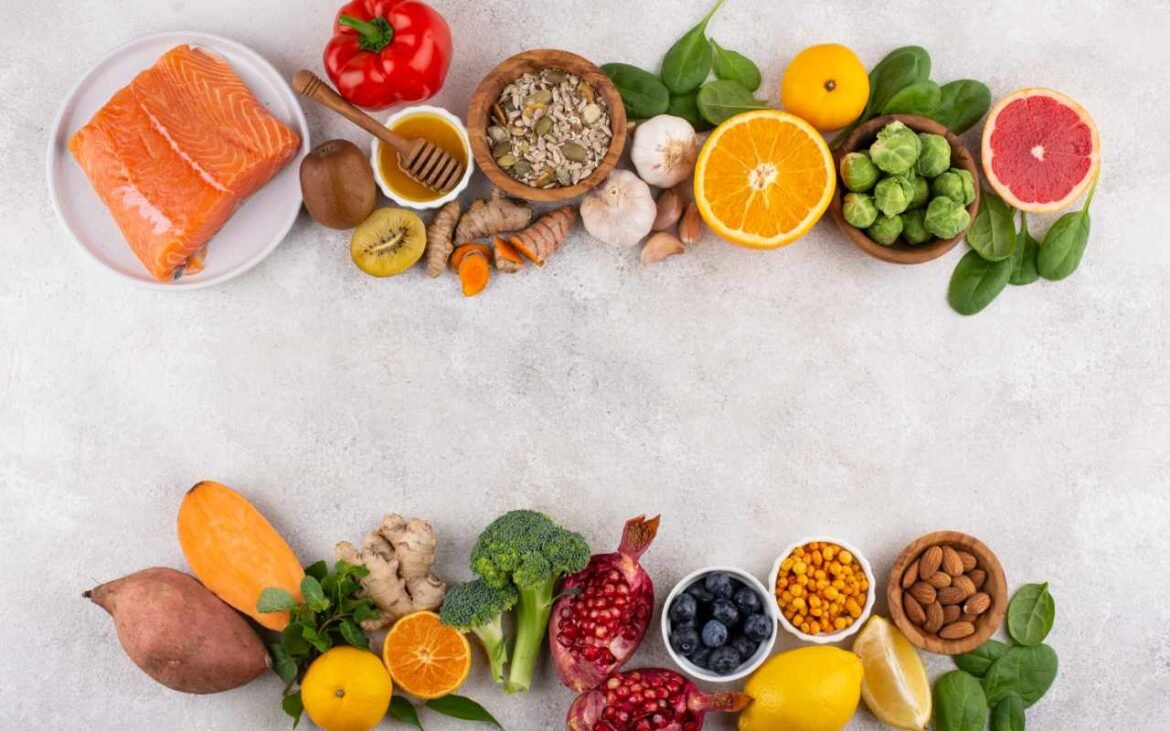Ever wondered why some people seem to have endless energy while others struggle to get through the day? The answer often lies in essential nutrients – those powerful compounds your body desperately needs but can’t produce on its own. Think of them as the premium fuel your body craves to perform at its absolute best.
You know that feeling when your car runs smoother with high-quality gas? That’s exactly what happens when you feed your body the right essential nutrients. These aren’t just fancy health buzzwords – they’re the building blocks that keep everything from your brain to your muscles firing on all cylinders.
Here’s the thing: in our fast-paced world, it’s surprisingly easy to miss out on these crucial nutrients, even when we think we’re eating well. But don’t worry – I’m going to walk you through five game-changing nutrients that can transform both your physical performance and mental clarity.
Understanding Essential Nutrients: The Foundation of Peak Performance
Let’s get real about what essential nutrients actually are. These are the compounds your body absolutely cannot function without, yet it either can’t make them at all or can’t produce enough to meet your needs. It’s like having a car that needs oil but can’t manufacture it – you’ve got to get it from somewhere else.
The scientific community divides these into two main categories:
Macronutrients are the heavy hitters – protein, carbohydrates, fats, and water. Your body needs these in larger amounts because they’re doing the major work of providing energy, building tissues, and keeping everything running smoothly.
Micronutrients might be needed in smaller amounts, but don’t let that fool you. Vitamins and minerals are like the precision tools in your body’s toolkit – without them, even the most basic cellular processes start breaking down.
What’s fascinating is how these nutrients work together. It’s not just about getting enough of one thing; it’s about creating a symphony where each nutrient plays its part. When you’re missing even one key player, the whole performance suffers.
The Power of a Balanced Diet in Nutrient Delivery
A balanced diet isn’t just some outdated concept your grandmother preached about – it’s actually your most powerful tool for delivering essential nutrients effectively. Think of it as creating the perfect playlist where every song (nutrient) contributes to an amazing overall experience.
The magic happens when you focus on nutrient-dense foods. These are the overachievers of the food world – they pack maximum nutrition into every bite. We’re talking about foods like leafy greens, fatty fish, nuts, and colorful vegetables that deliver more bang for your caloric buck.
Here’s where many people go wrong: they focus on calories instead of quality. You could technically meet your caloric needs with processed foods, but your body would be screaming for the nutrients it’s missing. It’s like trying to run a high-performance engine on cheap fuel – it might work temporarily, but you’re setting yourself up for problems.
Smart meal planning becomes your secret weapon here. When you organize your meals around diverse food groups, you’re essentially creating a safety net that catches most nutritional gaps before they become problems.
Essential Nutrient #1: Protein – Your Body’s Construction Crew
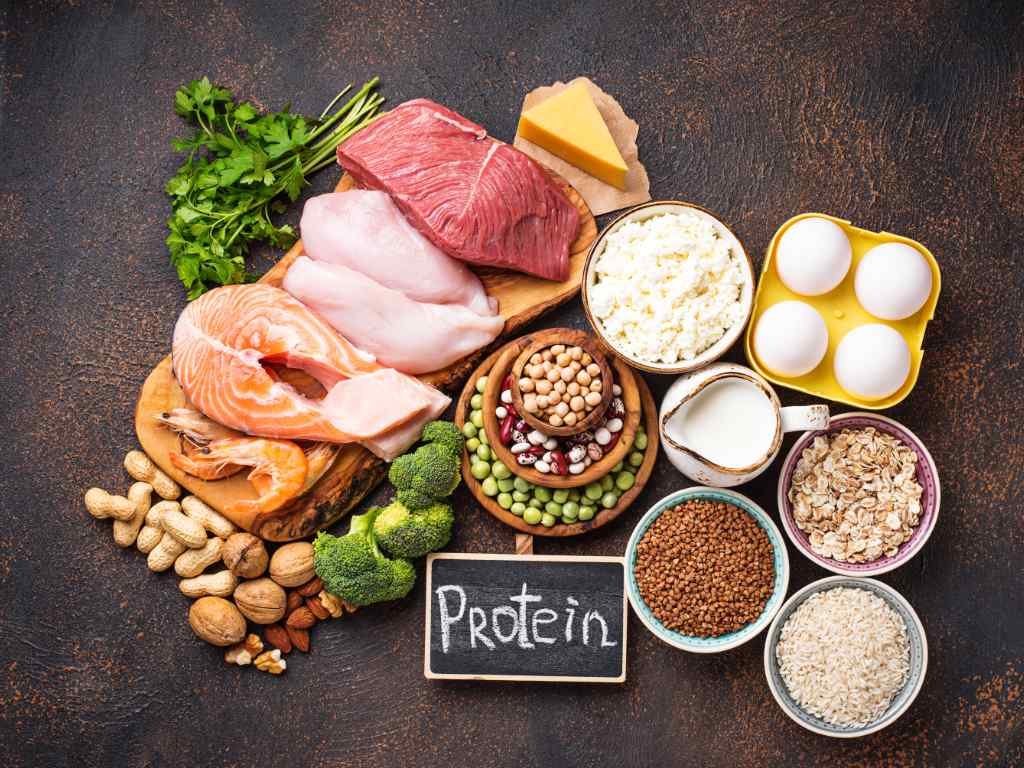
Protein is hands down one of the most crucial essential nutrients for both physical and mental performance. If your body were a construction site, protein would be both the building materials and the construction crew rolled into one.
What makes protein so special? It’s composed of amino acids – think of them as LEGO blocks that your body uses to build everything from muscle tissue to brain chemicals. Without adequate protein, your body starts cannibalizing its own muscle tissue just to keep essential functions running.
For physical performance, protein is absolutely non-negotiable. Every time you work out, you’re creating microscopic tears in your muscle fibers. Protein swoops in like a repair crew, not just fixing the damage but making the muscle stronger than before. This is why athletes and fitness enthusiasts are so focused on their protein intake – it’s literally what builds their performance capacity.
But here’s what many people don’t realize: protein is equally crucial for mental performance. Your brain relies on amino acids to produce neurotransmitters like serotonin and dopamine. Low protein intake can lead to brain fog, mood swings, and difficulty concentrating.
The best protein sources include:
- Lean meats like chicken, turkey, and grass-fed beef
- Fish and seafood (bonus points for omega-3s)
- Eggs (nature’s perfect protein package)
- Dairy products like Greek yogurt and cottage cheese
- Plant-based options like legumes, beans, and quinoa
Essential Nutrient #2: Omega-3 Fatty Acids – Brain Food Supreme
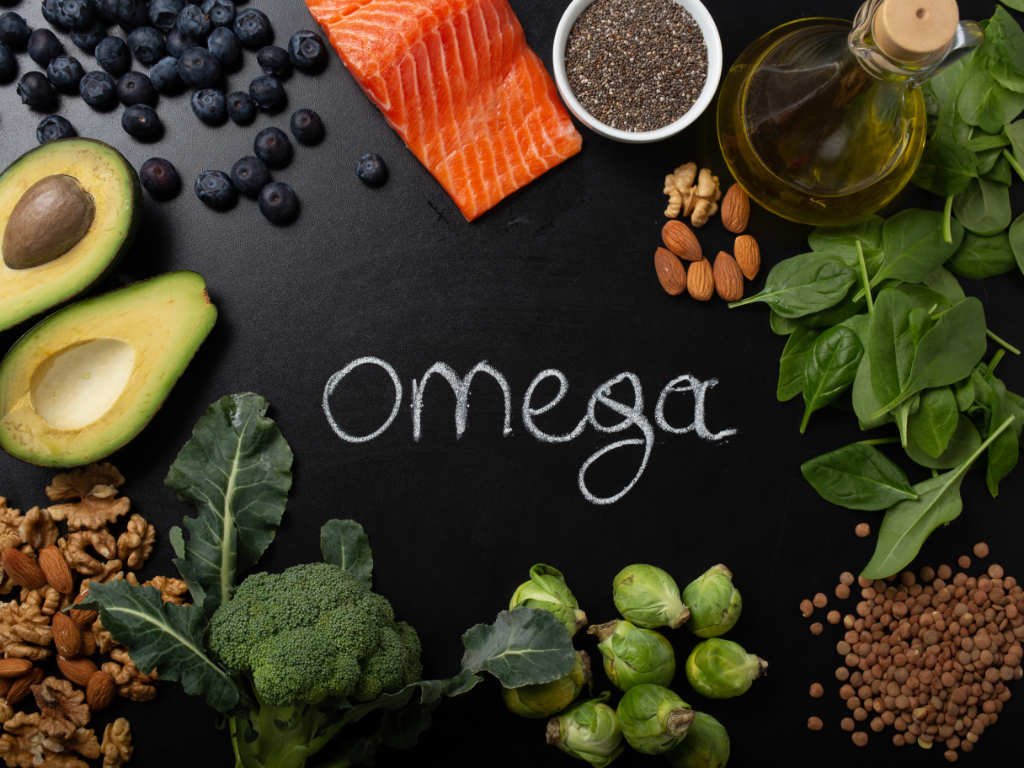
If protein is your body’s construction crew, then omega-3 fatty acids are like the premium upgrade package for your brain and cardiovascular system. These polyunsaturated fats are essential because your body simply cannot manufacture them – you have to get them from your diet.
The mental performance benefits of omega-3s are genuinely impressive. Research shows these fatty acids are crucial for brain function, memory formation, and mood regulation. People with adequate omega-3 intake often report sharper focus, better memory, and more stable moods. Some studies even suggest they can help reduce symptoms of depression and anxiety.
From a physical performance standpoint, omega-3s are your body’s natural anti-inflammatory agents. They help reduce exercise-induced inflammation, speed up recovery, and support cardiovascular health. This means better endurance, faster recovery between workouts, and overall improved athletic performance.
The challenge? Most people aren’t getting nearly enough omega-3s. The typical Western diet is loaded with omega-6 fatty acids (found in processed foods and vegetable oils) but severely lacking in omega-3s, creating an inflammatory imbalance.
Your best omega-3 sources include:
- Fatty fish like salmon, mackerel, sardines, and anchovies
- Flaxseeds and chia seeds (though these provide ALA, which your body must convert to the more active forms)
- Walnuts
- Algae-based supplements for those following plant-based diets
Pro tip: If you’re not eating fatty fish at least twice a week, consider a high-quality omega-3 supplement. Your brain and body will thank you.
Essential Nutrient #3: B Vitamins – Your Energy Production Factory
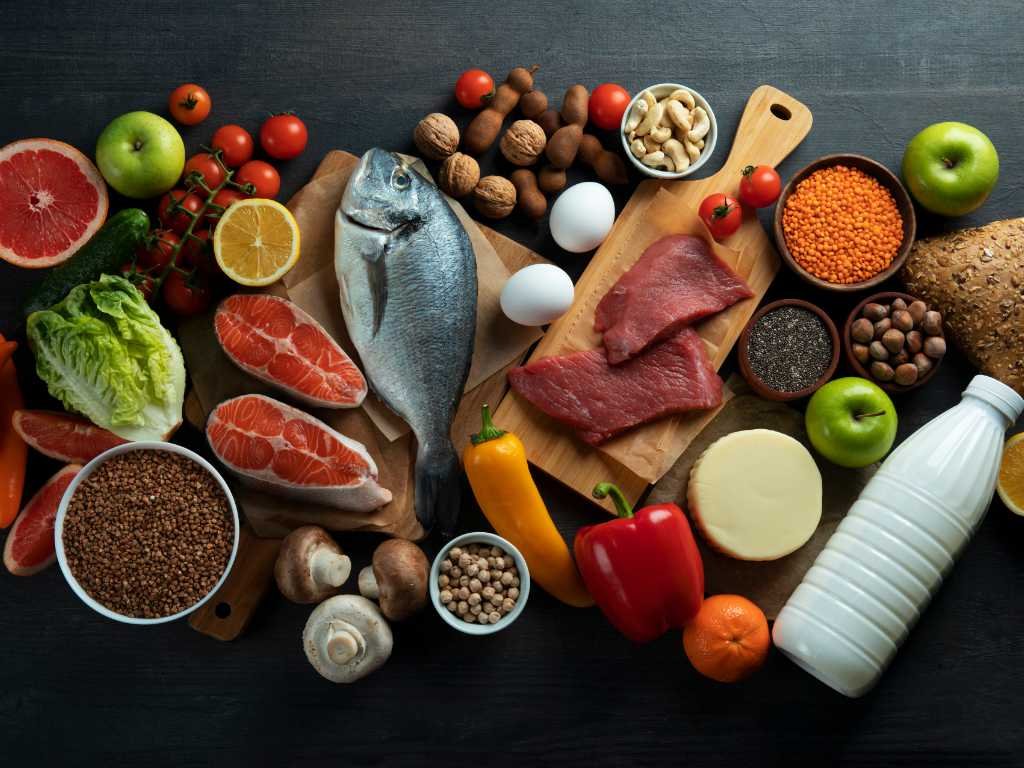
The B vitamin complex is like having an entire energy production factory running inside your cells. These eight essential vitamins (B1, B2, B3, B5, B6, B7, B9, and B12) work together to convert the food you eat into the energy your body can actually use.
Here’s where it gets interesting for mental performance: B vitamins are absolutely crucial for brain health and cognitive function. Vitamin B12, for instance, is essential for nerve function and the production of red blood cells. A deficiency can lead to brain fog, memory problems, and even depression. Folate (B9) and B6 are essential for neurotransmitter production and have been linked to reduced risk of cognitive decline.
For physical performance, B vitamins are the unsung heroes of your energy metabolism. They’re involved in every step of converting carbohydrates, fats, and proteins into ATP – the energy currency your muscles use during exercise. Without adequate B vitamins, you’re essentially trying to run a factory without enough workers.
The tricky thing about B vitamins is that they’re water-soluble, meaning your body doesn’t store them well. You need a consistent daily supply, and certain factors like stress, alcohol consumption, and intense exercise can increase your needs.
Excellent B vitamin sources include:
- Whole grains (especially fortified cereals)
- Leafy green vegetables like spinach and kale
- Eggs and dairy products
- Lean meats, especially liver (if you’re adventurous)
- Legumes and beans
- Nutritional yeast (a favorite among plant-based eaters)
Essential Nutrient #4: Fiber – The Unsung Hero of Sustained Performance
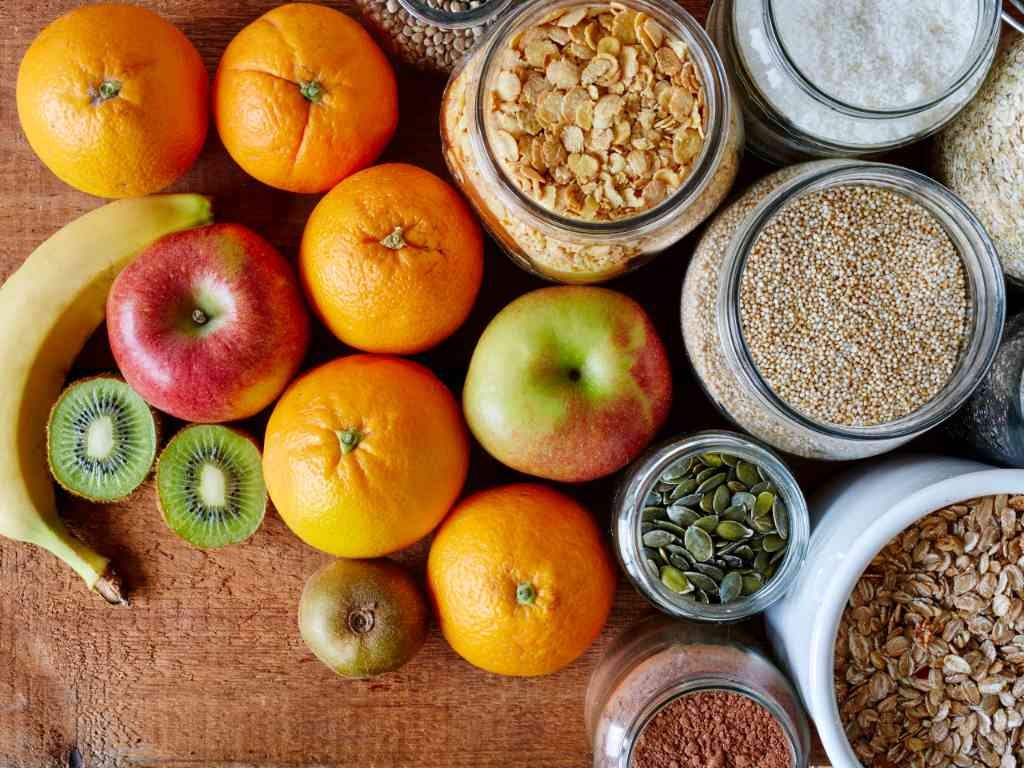
Fiber might not seem as glamorous as protein or omega-3s, but this essential nutrient is absolutely crucial for sustained physical and mental performance. Think of fiber as your body’s internal maintenance crew – it keeps everything running smoothly behind the scenes.
There are two types of fiber, and both are essential:
Soluble fiber dissolves in water and helps regulate blood sugar levels, keeping your energy steady throughout the day. It also feeds the beneficial bacteria in your gut, supporting a healthy microbiome that’s increasingly linked to both physical health and mental well-being.
Insoluble fiber adds bulk to your stool and keeps things moving through your digestive system. This might not sound exciting, but proper elimination is crucial for removing toxins and maintaining overall health.
For mental performance, fiber’s role in blood sugar regulation is key. When you eat refined carbohydrates without fiber, your blood sugar spikes and crashes, leading to energy dips and brain fog. Fiber slows down sugar absorption, providing steady fuel for your brain.
From a physical performance perspective, fiber supports gut health, which is increasingly recognized as central to overall health and athletic performance. A healthy gut microbiome supports immune function, reduces inflammation, and may even influence mood and motivation.
Great fiber sources include:
- Vegetables of all kinds (aim for variety)
- Fruits, especially berries and apples with skin
- Whole grains like oats, quinoa, and brown rice
- Legumes and beans
- Nuts and seeds
Most people need 25-35 grams of fiber daily, but the average intake is only about half that amount. Start increasing your fiber intake gradually and drink plenty of water to avoid digestive discomfort.
Essential Nutrient #5: Antioxidants – Your Cellular Protection Squad
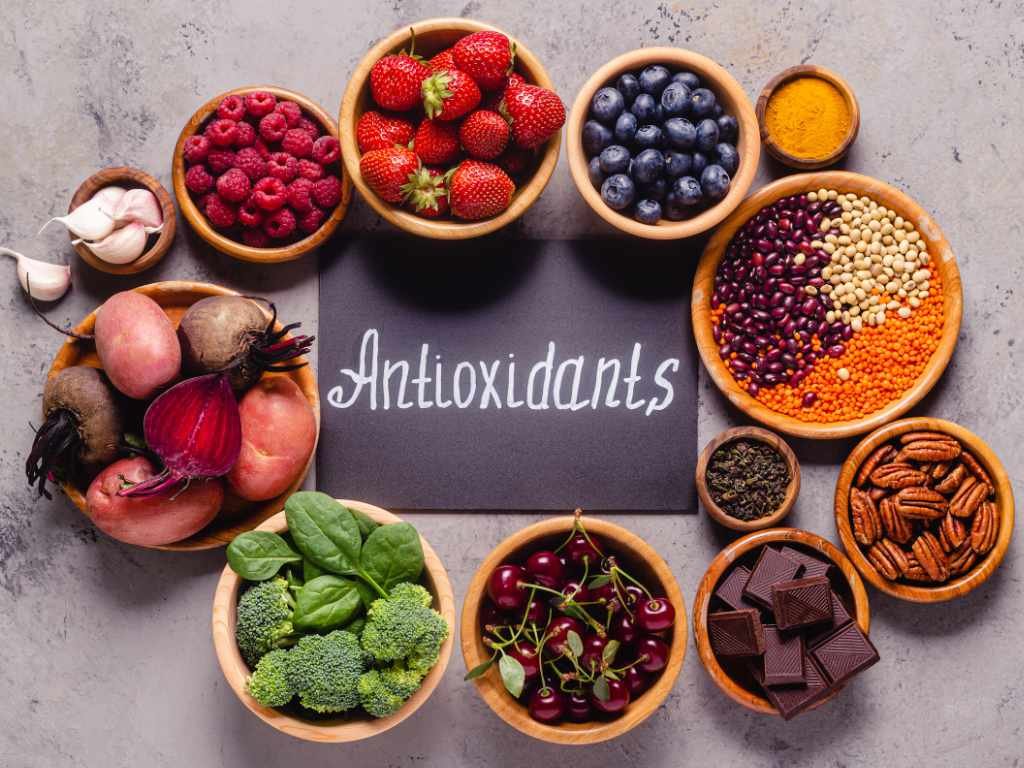
Antioxidants are like having a elite security team protecting your cells from damage 24/7. These compounds neutralize free radicals – unstable molecules that can damage cells and contribute to aging, inflammation, and various health problems.
The key antioxidant vitamins include Vitamin A, Vitamin C, and Vitamin E, but there are hundreds of other antioxidant compounds found in colorful fruits and vegetables.
For mental performance, antioxidants are crucial for protecting brain cells from oxidative stress. The brain is particularly vulnerable to free radical damage because it uses so much oxygen and energy. Adequate antioxidant intake is associated with better cognitive function, improved memory, and reduced risk of neurodegenerative diseases.
Physical performance benefits are equally impressive. Intense exercise naturally produces free radicals, and while some of this is actually beneficial for training adaptations, too much can impair recovery and performance. Antioxidants help maintain the right balance, supporting recovery while allowing your body to adapt to training stress.
Here’s where food beats supplements hands down: whole foods provide antioxidants in complex combinations that work synergistically. This is why eating a rainbow of colorful foods is so much more effective than popping a single antioxidant pill.
Top antioxidant sources include:
Vitamin A: Sweet potatoes, carrots, leafy greens, and orange vegetables
Vitamin C: Berries, citrus fruits, bell peppers, and broccoli
Vitamin E: Nuts, seeds, spinach, and vegetable oils
Other powerful antioxidants: Dark berries, green tea, dark chocolate, and colorful vegetables
The key is variety – different antioxidants protect different parts of your cells, so eating a diverse range of colorful foods ensures comprehensive protection.
What Are the Six Essential Nutrients Your Body Needs Daily?
According to nutritional science, your body requires six classes of essential nutrients daily: proteins, carbohydrates, fats, vitamins, minerals, and water. Each plays a unique role in maintaining optimal health and performance.
How Do Macronutrients Differ from Micronutrients?
Macronutrients (proteins, carbohydrates, fats) are needed in large amounts and provide energy, while micronutrients (vitamins, minerals) are required in smaller quantities but are crucial for cellular functions, immune support, and metabolic processes.
Can You Get All Essential Nutrients from Food Alone?
While a well-planned, diverse diet can provide most essential nutrients, some people may benefit from targeted supplementation, especially for nutrients like vitamin B12 (for vegans), vitamin D (in low-sun climates), or omega-3s (for those who don’t eat fish regularly).
What Happens When You’re Deficient in Essential Nutrients?
Nutrient deficiencies can manifest as fatigue, poor concentration, frequent infections, slow wound healing, mood changes, and decreased physical performance. Severe deficiencies can lead to serious health conditions and significantly impact quality of life.
How Much of Each Essential Nutrient Do You Need?
Nutrient needs vary based on age, sex, activity level, and health status. The Dietary Reference Intakes provide science-based recommendations, but working with a healthcare provider or registered dietitian can help determine your individual needs.
Practical Tips for Maximizing Essential Nutrient Intake
Getting all these essential nutrients doesn’t have to be complicated. Here are some practical strategies that actually work in real life:
Eat the rainbow: Different colored foods provide different nutrients. Aim for at least five different colors on your plate throughout the day.
Plan your protein: Include a high-quality protein source at every meal and snack. This ensures steady amino acid supply for both muscle building and brain function.
Don’t fear healthy fats: Include sources of omega-3s and other healthy fats daily. A handful of walnuts, some avocado, or a serving of fatty fish can make a huge difference.
Choose whole foods over processed: Whole foods come packaged with complementary nutrients and fiber that help your body absorb and utilize nutrients more effectively.
Stay hydrated: Water is an essential nutrient too, and proper hydration is crucial for nutrient transport and cellular function.
Consider meal prep on weekends to ensure you have nutrient-dense options available during busy weekdays. When you’re rushed, you’re more likely to grab whatever’s convenient, which is often not the most nutritious choice.
For those interested in optimizing their nutrient intake further, exploring superfoods for brain power can provide additional cognitive benefits, while understanding powerful probiotic foods can support the gut health that’s essential for nutrient absorption.
The Synergistic Effect: When Essential Nutrients Work Together
Here’s something most people don’t realize: essential nutrients don’t work in isolation. They’re like members of an orchestra – each has its own part to play, but the magic happens when they all work together in harmony.
For example, vitamin C enhances iron absorption, while vitamin D improves calcium utilization. The B vitamins work as a team to support energy metabolism, and omega-3 fatty acids help your body absorb fat-soluble vitamins (A, D, E, K) more effectively.
This is why focusing on individual supplements often falls short compared to eating a varied, nutrient-dense diet. Whole foods provide nutrients in combinations that enhance each other’s absorption and effectiveness.
The bottom line? Your body is an incredibly sophisticated system that thrives on essential nutrients working in concert. When you provide all these key nutrients consistently, you’re not just avoiding deficiency – you’re creating the optimal conditions for peak physical and mental performance.
Remember, building better nutrition habits is a journey, not a destination. Start with one or two changes, master those, then gradually expand your nutrient repertoire. Your future self – both body and mind – will thank you for the investment you make today.


